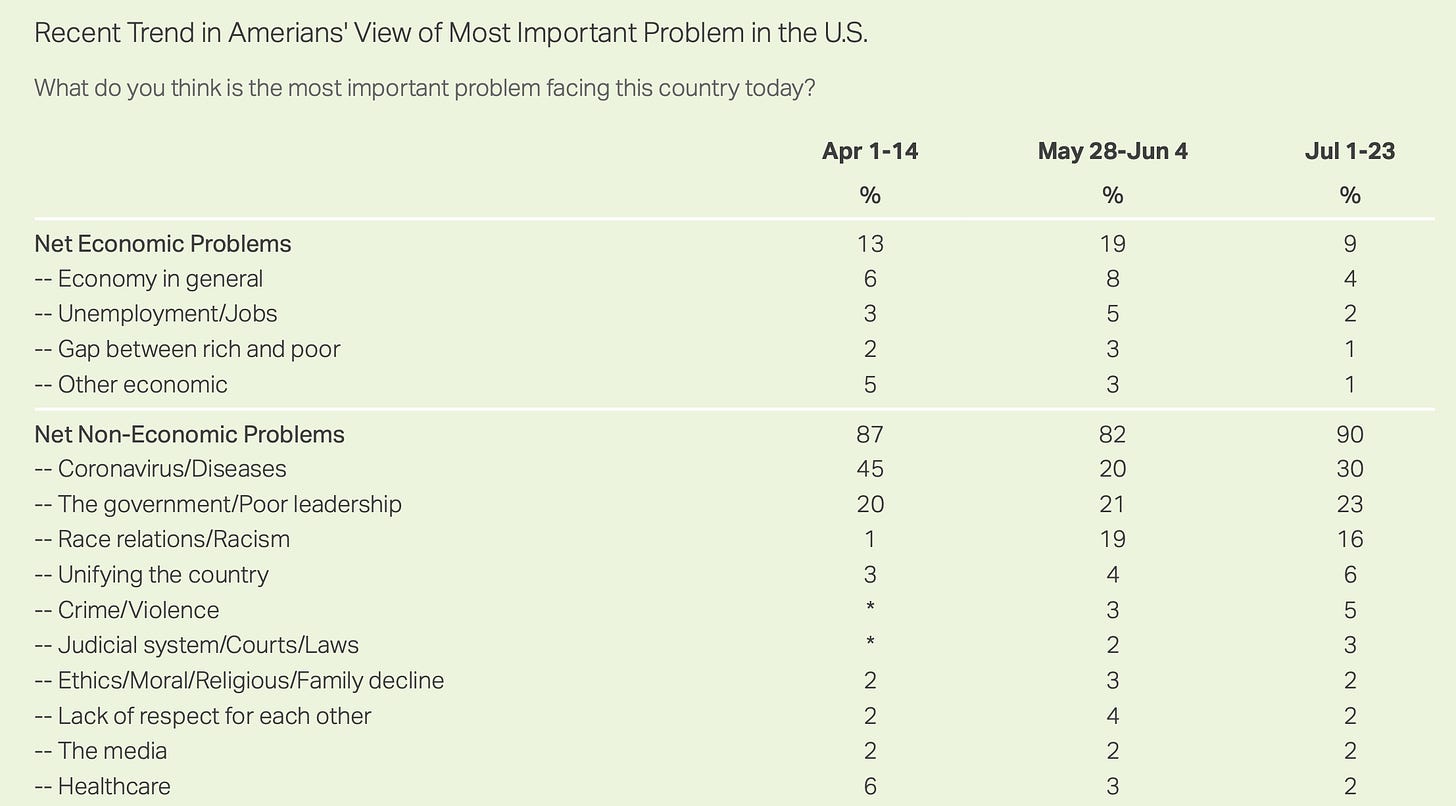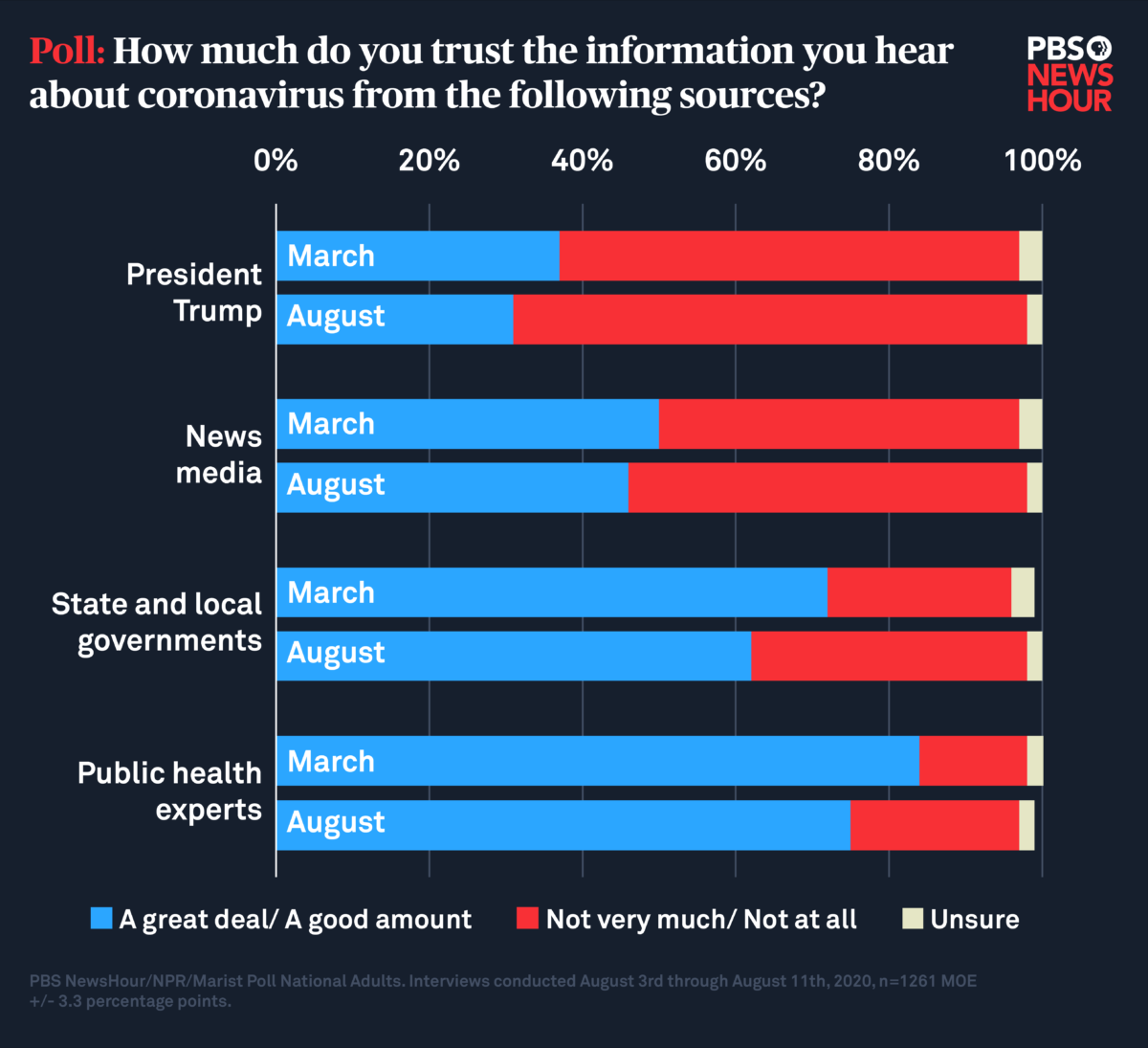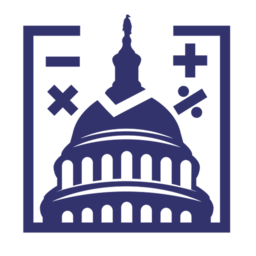This is exactly how covid-19 costs Trump voters
Voters punish the president when people around them die under his watch
In Wednesday’s post on the election—the first in series updating subscribers on the conditions of the 2020 race—I wrote about what polls and forecasting models have to say about Joe Biden and Donald Trump’s chances of winning the White House. The answer was that Trump is an underdog with maybe half the chance of winning that he had on this day in 2016. It would take both a large reversion in the trends of the campaign and a sizable polling error for him to turn around his flailing campaign.
This sort of horse race journalism only gets us so far, though. Today I want to lean on public polls and begin ask the question of why Donald Trump is so far behind Joe Biden in the polls? What, exactly, makes him so unpopular? And to which voters?
There are several primary reasons for Trump’s deficit.
The first, and most obvious, is his abject failure to deal with the coronavirus pandemic. That is the one I will write about today. We will discuss other causes—like unrest in the cities and psychological effects of Joe Biden’s candidacy—in coming newsletters.
Editor’s Note: These updates to the campaign will continue at a higher-than-usual frequency throughout the fall election cycle. If you have friends that you think would benefit from this newsletter, please feel free to forward it to them.
Let’s start with the basics. According to Gallup, 50% of voters rank covid-19 or the government’s lacking response as the most important problem in America today.

In simple terms, that’s bad news for the president. His ratings on the issue have been low—often lower than his overall approval rating—and are falling gradually over time. Here’s how PBS NewsHour put it in a write-up of one of their polls in early August:
Trump’s sinking approval rating is due in part to his handling of the coronavirus pandemic. This month, the U.S. reached 5 million confirmed cases of COVID-19, more than any other country in the world, as states struggle to scale up to recommended levels for testing and contact tracing, and the daily death toll has rebounded to levels not seen since mid-May.
Fifty-three percent of U.S. adults think Biden would handle the coronavirus pandemic better than Trump, while 37 percent think Trump would do a better job. Another 5 percent don’t think either candidate has what it takes to manage the pandemic, and 5 percent more weren’t sure.
Regardless of who they think is best equipped to handle the crisis, most Americans are concerned by the pandemic, and many say it will factor into their decision in November.
The vast majority of voters also don’t trust Mr Trump when it comes to the virus:

Of course, none of this data evidences the causal role of covid-19 depressing actual support for President Trump in vote intention. But we do have data on this from other sources.
Christopher Warshaw, Lynn Vavreck, and Ryan Baxter-King—political scientists at the George Washington University and the University of California Los Angeles—took a massive poll of over 300,000 people and matched up their self-professed support for Mr Trump with actual data on the number of deaths from covid-19 in the county where the respondent lives. Then, they run a predictive model to determine whether (and by how much) more deaths from covid-19 reduces support for the president. after controlling for a bunch of variables (like geography, demography and time in the election year). They find that more covid deaths decrease both (a) voters’ approval of the president and (b) their likelihood to vote for him. They write:
A doubling of COVID-19 fatalities (.7 units on the log scale) at the county level leads to roughly a .15% reduction in President Trump’s approval rating and a doubling in fatalities at the state level leads to a .5% reduction in the President’s approval. In the presidential election, a doubling of COVID-19 fatalities at the county level makes Americans about .15% less likely to support President Trump against Joseph R. Biden and a doubling in fatalities at the state level leads to a .3% reduction in support for Trump
And they produce this graphic:

Surely I am not the only one who finds these results remarkably… confirmatory, right? After all, political scientists have long found that voters punish the president when things are going poorly. Although their theories typically operationalize a contracting economy or deaths from foreign wars as the independent variable (IE they way they capture “things are going poorly”), it is not so hard to imagine the response to the coronavirus pandemic operating ins a similar way. (And we can’t ignore that the economy is bad right now, either).
Voter backlash to Trump’s handling of the virus has been highlighted among older Americans. Here is a clipping from a segment on NPR’s Weekend Edition:
Joe Biden, Trump's Democratic challenger, is working hard to make sure that doesn't happen, airing ads aimed at seniors critical of Trump's handling of the coronavirus pandemic response.
One shows a pair of elderly retirees peering out from their home, where they're sheltering in place. "While I don't blame Donald Trump for the virus, I blame him for his lack of action," Donna says.
The group Republican Voters Against Trump is also webcasting video testimonials from older white voters who say they're switching to Biden.
"It's OK that we voted for Donald Trump in the first election," says a man identified as Joseph in Florida. "Do I want a Democrat? Do I want Joe Biden? Not really. But four more years of Donald Trump will be disastrous for the country."
Polls suggest more seniors are feeling this way, so NPR recently reached out to a random group of older voters who cast ballots for Trump in 2016. Many said they are deeply troubled by the president's behavior.
"He's not exactly the most trustworthy individual," said Marty Stango, 77, who lives near Jacksonville, Fla. "He definitely will throw out things that are absolute lies."
"I really don't think his character is great, you know?" said Doris Harrington, 82, who lives in Des Moines, Iowa. "His morals are not my morals."
A lot of seniors who backed Trump four years ago also told NPR they're tired of his tweets and dislike his use of profanity, and many rate him poorly on his handling of the pandemic.
(NB: I always like when reporters combine interviews with voters and polling data. I wish I did it more often.)
So, where does this leave us for now? At a base level, Trump is failing on the biggest issue of the day. And although new cases and deaths are trending downward—which we would think might reflect positively on the incumbent, all else considered—President Trump also has to deal with Bob Woodward’s publication of some pretty damning evidence that he new early the virus was deadly and underplayed it anyway. According to the Washington Post, the president said:
“You just breathe the air and that’s how it’s passed,” Trump said in a Feb. 7 call. “And so that’s a very tricky one. That’s a very delicate one. It’s also more deadly than even your strenuous flus.”
“This is deadly stuff,” the president repeated for emphasis.
[….]
Trump admitted to Woodward on March 19 that he deliberately minimized the danger. “I wanted to always play it down,” the president said. “I still like playing it down, because I don’t want to create a panic.”
Given the evidence, it’s hard to see Trump turning this issue around into a boost for his candidacy.




What do you think is Trumps best chance to change the narrative to improve his reelection odds between now and election day? Do you think you will see vulnerable Republicans abandon Trump as the election gets closer if his standings in the polls doesn't improve? - Great Article!!!!
Wait - why should I be impressed with 0.15% drop in support? How does this translate into numbers of votes in specified states?